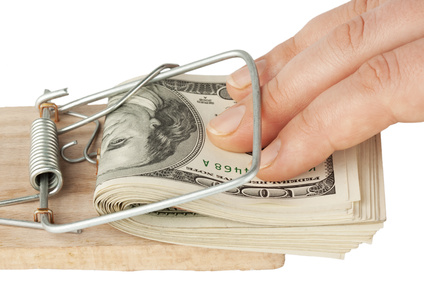Marla Tabaka | Inc
Money changes everything, doesn’t it? Keep the cash flowing by avoiding the biggest financial mistakes you could make in your company’s early years.
Cash flow is the lifeblood of small business. If you run out of cash before you can create a following and steady income, it’s game over. Too many promising businesses end up forgotten on the sidelines, with the founders financially and emotionally devastated.

Could the statistics change? Could more new entrepreneurs grow into seasoned, successful business owners? According to debt solutions attorney Emily Chase Smith, there is hope.
“I see the fallout of failed businesses too often,” says Smith. “I want to shout from the rooftops, ‘It didn’t have to happen this way!'” Smith knows that, had the founders done a little more financial preparation prior to launch, the outcome for these failed businesses would have been different.
Smith offers these insights into the five biggest money mistakes that keep start-ups from hitting it out of the ballpark. Put your business in the winner’s column by avoiding them!
1. Underestimating Your Needs
Conventional wisdom when traveling is to bring half as many clothes and twice as much money. On your entrepreneurial journey, bring twice as much time and twice as much money–that’s right, double everything across the board.
Everything takes longer in the trenches than it appears to in the planning stages. There are also costs you can’t imagine until you absolutely need that one linchpin item to complete a customer delivery.
Take your realistic, conservative business plan numbers and double them. You don’t want to run out of money or credit in the middle of your big play.
2. Going Too Large
Entrepreneurs dream big, and our eyes are sometimes bigger than our wallets. Set yourself up for success by distinguishing between what’s necessary and what can wait. For example, if you commonly meet with clients, you may need a professional office space. However, if you’re starting up, you don’t need an entire office suite. In fact, you would be better served by subleasing a single office in a larger suite. Subleasing will save you money, and, as a side benefit, you will create professional relationships that may generate new business. And, if you meet with clients in their homes, you don’t need an office at all. What you do need is a good haircut, suit, and briefcase. Invest in the things that will create the experience and impression you want to make on your clients and forgo the stuff that remains behind the scenes.
3. Packing in the Payroll
Payroll will be one of your largest expenses. Employees make an entrepreneur feel like a big cheese–they make us feel like we’re successful and contributing members of society–but many an entrepreneur quickly becomes the lowest-paid person at the company. I’m pretty sure living on minimum wage wasn’t what you had in mind when you started your business.
Before you add anyone to your team, be very clear on what each position is to accomplish. With that clarity, look to independent contractors for their expertise. Hire full-time employees only when you can keep them busy in their core competency on a long-term basis. Resist the temptation to compare hourly rates of employees to independent contractors. Independent contractors cost more hourly (sometimes a lot more), but they’re experts in their fields. You save time in training and supervision, and, best of all, you save cash in the long run.












